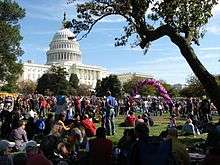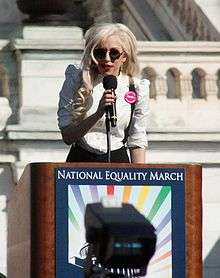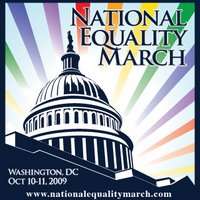National Equality March
|
Logo for the march | |
| Date |
October 11, 2009 (National Coming Out Day) |
|---|---|
| Location | Washington, D.C. |
| Participants | lesbian, gay, bisexual, and transgender (LGBT) rights activists and supporters |
| Outcome |
Matthew Shepard Act signed into law (October 22); US President Barack Obama committed to end "Don't ask, don't tell", the US military policy forbidding gays, bisexuals, and lesbians to serve openly |
| Website | www.NationalEqualityMarch.com |

The National Equality March was a national political rally that occurred October 11, 2009 in Washington, D.C. It called for equal protection for lesbian, gay, bisexual, and transgender (LGBT) people in all matters governed by civil law in all 50 states and the District of Columbia.[1] The march was called for by activist David Mixner and implemented by Cleve Jones,[2] and organized by Equality Across America and the Courage Campaign.[3] Kip Williams and Robin McGehee served as co-directors. Leaders like actress Michelle Clunie and New York gubernatorial aide Peter Yacobellis hosted the first fundraiser in the spring of 2010. This was the first national march in Washington, D.C. for LGBT rights since the 2000 Millennium March.[4]
Many groups joined by also organizing other events for the weekend, which coincided with National Coming Out Day on October 11 and marked eleven years since the beating and murder of gay University of Wyoming student Matthew Shepard, which prompted national attention and action to expand hate crime laws.
Equality Across America, which is fiscally sponsored by the non-profit Tides Center, states it intends to develop a network of decentralized organizers from each of the 435 U.S. Congressional districts.[1]
History
Hundreds of thousands of LGBT rights activists marched on Sunday, October 11, 2009 from the White House to the Capitol, demanding that President Barack Obama keep his promises to allow gays to serve openly in the military and work to end discrimination against LGBT people.[5] Many organizers were outraged after the passage of California's Proposition 8, which overturned the right of gays to get married in that state, and over perceived slights by the Obama administration.[6] Though there were no official crowd estimates,[7] mainstream media outlets estimated as many as 200,000 people participated.[5] Unlike the first national LGBT march in 1979 and others in 1987, 1993 and 2000 that included celebrity performances and drew as many as 500,000 people, the event was driven by grassroots efforts and was expected to be more low-key.[6]
Because organizers made extensive use of online social media tools to recruit and organize participants, the event was organized faster and more economically than those previous events.[8] Organizers spent $156,000 to produce the event, and raised approximately $260,000.[9] The surplus funds are being used by Equality Across America to pursue full Federal equality for LGBT people.[10]
March route
15th Street NW closed for staging between I Street NW and M Street NW. The march began at the intersection of I Street NW and 15th Street NW and initially headed south on Vermont Avenue NW then turned right on H Street NW. The march proceeded west past Lafayette Park, south on 17th Street NW, and then east on the closed portion of Pennsylvania Avenue immediately facing the White House before turning south on 15th Street NW. Finally, the march followed Pennsylvania Avenue to the United States Capitol.
Workshops
There were a series of workshops, including one on tactics for repealing "Don't Ask, Don't Tell", a law prohibiting gays and lesbians from serving openly in the armed forces.[11] In addition, other workshops were on "How to Organize on Campus" and "Adoption Option: Adoption Is an Option." A "Transgender Community Building Caucus" was held.[11] Cleve Jones and Sherry Wolf held a workshop at Busboys and Poets café, with several hundred attending, on The Struggle for LGBT Liberation.
Speakers

After the march a rally at the US Capitol featured more than 30 speakers,[12][13] including:
- Jarrett Barrios – President of the Blue Cross and Blue Shield Foundation of Massachusetts and President of the Gay & Lesbian Alliance Against Defamation (GLAAD)
- Dustin Lance Black – American screenwriter, director, television producer, and LGBT rights activist
- Julian Bond – chairperson of NAACP and former Georgia State Senator who has often likened the US gay rights movement to the African-American Civil Rights Movement, as he did in a Washington Post op-ed explaining his reasons for participating in the march[14]
- Staceyann Chin – spoken word poet, performing artist and LGBT rights activist
- 1st Lt. Daniel Choi – openly gay United States Army combat veteran and Arabic linguist whose discharge from the New York Army National Guard under the "Don't Ask, Don't Tell" policy is currently being reviewed
- Penelope Williams - Dominican American bisexual and immigration right activist, spokesperson for national bisexual rights group BiNet USA, officially introduced bisexual speaker Lady Gaga[15]
- Lady Gaga – singer and bisexual-identified LGBTQ activist
- Michael Huffington – conservative bisexual activist, former United States Congressman, film producer
- Tanner Efinger – March Organizer and Founder of Postcards to the President
- Cleve Jones – the march’s co-chairperson and longtime gay rights activist
- David Mixner – civil rights activist and best-selling author
- Nicole Murray-Ramirez – LGBT rights activist and a San Diego city commissioner
- Chloe Michelle Noble – bi-queer human rights activist and founder of Homeless Youth Pridewalk and Operation Shine America
- Cynthia Nixon – lesbian-identified bisexual actress, most notably from Sex and the City
- Reverend Troy Deroy Perry II – founder of the Metropolitan Community Church
- Christine C. Quinn – first openly gay speaker of the New York City Council Speaker
- Bill Rosendahl – openly gay Los Angeles City Council member
- Judy Shepard – mother of brutally murdered gay University of Wyoming student Matthew Shepard and co-founder of the Matthew Shepard Foundation
- Babs Siperstein – the first openly transgender member of the Democratic National Committee
- Maxim Thorne – Senior Vice President of the NAACP
- Urvashi Vaid – LBGT activist
- Lawrence Webb – first openly gay, African-American elected official in the Commonwealth of Virginia, Falls Church City Council member
- Sherry Wolf -author, LGBT and socialist activist, associate editor of International Socialist Review
- Kit Yan – slam poet, musician, activist, and out transgender man
Endorsements
The National Equality March was endorsed by many of the major national LGBT organizations,[16] including GLAAD, HRC, MCC, the Task Force, and P-FLAG. In addition, it was endorsed by other organizations, such as the Screen Actors Guild, including many SAG members who individually endorsed the march as well. As well, the march was endorsed by other individuals, politicians, such as Senate Majority Leader Harry Reid,[17] faith leaders such as Rabbi and President of North American Reform Judaism, Eric Yoffie,[18] and others.
See also
| Wikiquote has quotations related to: National Equality March |
References
- 1 2 "National Equality March – Our Single Demand". Equality Across America. Retrieved October 11, 2009.
- ↑ Cleve Jones Joins Call for National LGBT March on Washington D.C.
- ↑ Roehr, Bob (October 15, 2009). "National Equality March draws 100,000 to DC". Bay Area Reporter. Retrieved October 16, 2009.
- ↑ "New group wants march on DC". Bay Area Reporter. Retrieved October 11, 2009.
- 1 2 Cloud, John (October 12, 2009). "The Gay March: A New Generation of Protesters". Time. Retrieved October 29, 2009.
- 1 2 Zongker, Brett (October 11, 2009). "Gay Rights Advocates March on D.C., Demand That Obama Keep His Pledges". Associated Press. Retrieved November 8, 2009.
- ↑ Clary, Greg (October 11, 2009). "'Obama, I know you are listening': Gay rights activists march in D.C.". CNN. Retrieved October 12, 2009.
- ↑ Browning, Bil (November 5, 2009). "The Finances Behind the National Equality March". The Bilerico Project. Retrieved June 16, 2010.
- ↑ "We have a new leadership team!". Equality Across America. June 16, 2010. Retrieved June 16, 2010.
- 1 2 House OKs Matthew Shepard Act to protect gays, Los Angeles Times, October 8, 2009
- ↑ Previewing National Equality March, MSNBC, October 10, 2009
- ↑ "National Equality March Rally". GayCities.com. Retrieved October 12, 2009.
- ↑ Bond, Julian (October 9, 2009). "Rights Still to Be Won". Washington Post. Retrieved October 11, 2014.
- ↑ "National Equality Rally". c-spanvideo.org. Retrieved October 5, 2013.
- ↑ The Road to Full Equality – The National Equality March, Gay and Lesbian Times, Randy Hope, October 8, 2009
- ↑ ‘Our fight for full equality’, SOVO, Amy Cavanaugh, October 9, 2009
- ↑ On Eve of March, Faith Drives Activism for Gay Rights Supporters, BeliefNet, September 30, 2009
External links
![]() Media related to National Equality March at Wikimedia Commons
Media related to National Equality March at Wikimedia Commons


